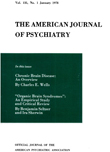Personality traits and disorder in depression
Abstract
The authors examined the relationship of personality traits and personality disorder to depressive subtype, descriptive characteristics, and outcome in 160 depressed inpatients. Personality disorder was significantly more common in unipolar nonmelancholic depressed patients (61%) than in unipolar melancholic (14%) or bipolar depressed patients (23%). Personality disorder did not affect symptom manifestation but was related to earlier onset of depressive illness and worse outcome within the unipolar nonmelancholic group. Obsessive traits were most common in the unipolar melancholic patients, while histrionic, hostile, and borderline traits predominated in the nonmelancholic patients. The authors discuss the usefulness of a multiaxial diagnostic system and the importance of separating trait and disorder in personality assessment.
Access content
To read the fulltext, please use one of the options below to sign in or purchase access.- Personal login
- Institutional Login
- Sign in via OpenAthens
- Register for access
-
Please login/register if you wish to pair your device and check access availability.
Not a subscriber?
PsychiatryOnline subscription options offer access to the DSM-5 library, books, journals, CME, and patient resources. This all-in-one virtual library provides psychiatrists and mental health professionals with key resources for diagnosis, treatment, research, and professional development.
Need more help? PsychiatryOnline Customer Service may be reached by emailing [email protected] or by calling 800-368-5777 (in the U.S.) or 703-907-7322 (outside the U.S.).



